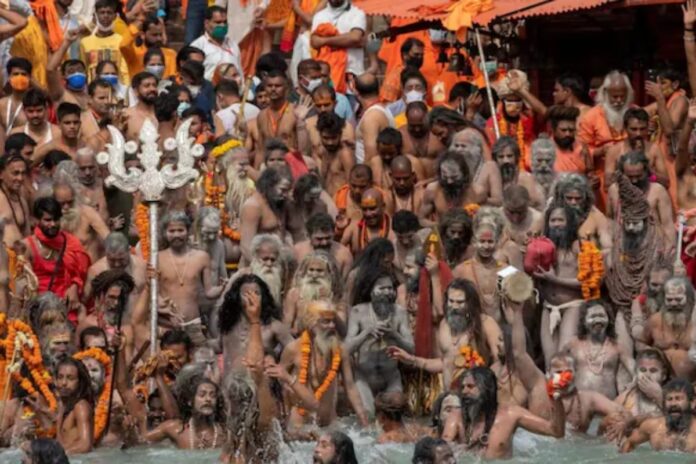Mahant Ravindra Puri, the chief of the Akhil Bhartiya Akhada Parishad, announced that Muslims couldn’t set up shops during the Mahakumbh Mela. The religious leader stated that although Hindus and Muslims share a sense of brotherhood, Muslims’ participation as shopkeepers during the festival could “corrupt religion.” His comments have sparked debates over inclusivity and traditions ahead of the event, which is scheduled to take place in Prayagraj from January 13 to February 26.
Religious Concerns Over Business Participation
Addressing the media, Mahant Ravindra Puri explained, “Although Muslims are our brothers, and we don’t have any enmity with them, they shouldn’t set up shops during the upcoming Mahakumbh Mela as they will corrupt our religion. They shouldn’t set up grocery shops, juice shops, food stalls, or tea shops, as they spit on the food deliberately.” This remark reflects concerns about maintaining the perceived purity of the religious atmosphere during the grand spiritual gathering.
The Mahakumbh Mela, one of Hinduism’s most sacred events, occurs every 12 years and attracts millions of devotees seeking spiritual cleansing and blessings. With preparations in full swing, the statement has drawn attention to the balance between religious traditions and the inclusion of diverse communities.
Instances Of Hindu-Muslim Unity In The Festival
Despite the restrictions proposed for Muslim shopkeepers, Mahant Puri acknowledged instances of Hindu-Muslim cooperation in the preparations for the Mahakumbh Mela. Highlighting examples, he mentioned that Muslim bands were included in the cantonment entry of the Niranjani Akhada. Additionally, the contractor responsible for building the mutt of the Akhil Bhartiya Akhada Parishad was also a Muslim.
Iqbal Ahmed, the owner of the Azad Band, expressed his gratitude for being part of the festivities. “It is a great fortune for me to contribute to the Mahakumbh Mela. We see it as a matter of pride and responsibility,” he said, underlining the spirit of unity amidst differing faiths.
The Mahakumbh Mela: A Historical Perspective
The Mahakumbh Mela, celebrated every 12 years, is deeply rooted in Hindu mythology and tradition. It is believed to be the time when the nectar of immortality, churned from the ocean during the Samudra Manthan, fell on Earth. The event is marked by ritualistic bathing at the confluence of the holy rivers Ganga, Yamuna, and the mythical Saraswati, which is considered a way to cleanse one’s sins and achieve moksha (salvation).
Over centuries, the festival has grown into a global spectacle, drawing saints, seers, and pilgrims from across the world. It also serves as a platform for cultural exchange and the promotion of India’s spiritual heritage.
Controversy and Tradition
The restriction on non-Hindu shopkeepers during the festival raises questions about religious inclusivity. While Mahant Puri’s comments reflect concerns about preserving tradition, they also highlight the complexities of balancing religious values with modern practices in a diverse society.
As the Mahakumbh Mela approaches, discussions around these issues are likely to intensify, drawing attention to the significance of the festival and its place in contemporary India. Despite the controversies, the event remains a symbol of faith, devotion, and the rich cultural tapestry of the nation.

